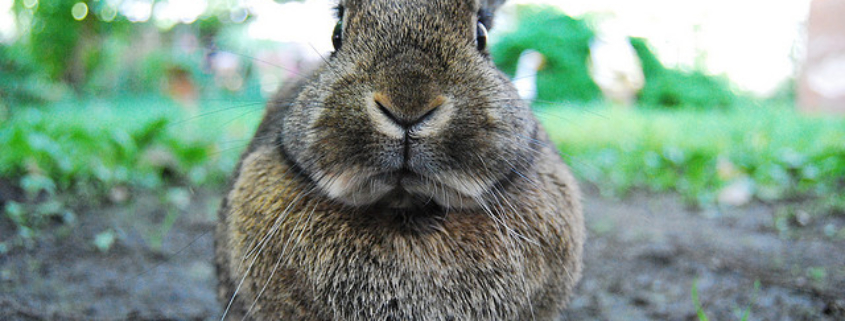On Umwelt and Writing About Family in Nonfiction
When I was eight years old, my father brought home a rabbit. He and my uncle had been foraging for mushrooms when they found it cowering under a pine tree. Its leg was broken and it was unable to move quickly but it was otherwise a large, healthy rabbit. Its fur was thick and gray, and it wore a docile, passive expression on its rabbit face, as if the world was simply happening to it and that was just fine. I’m sure that, had my father not taken it, the rabbit would have made fine, fatty meal for a coyote.
The day he brought the rabbit home, I was sitting in the living room of our twenty-first floor apartment in Toronto playing with Legos. My legs were crossed and I was scrutinizing the pictorial instruction booklet that explained how to attach hoses and switches to the pneumatic pump. The door opened and I heard my father plop down his many foraging baskets; I scrambled to my feet and rushed to the foyer. Taking inventory of my father’s haul was a job to which I had assigned myself: an eight-year-old inspector of goods. “I have something special for you today,” said my father, wiping his hands on his jeans. I expected a bucket of belayi—King Bolets, the finest of the wild mushrooms, the ones with the clean white stalks and ruddy red caps—but instead my father produced a plastic bucket I had not seen before. I peeked inside. There, curled up like a fuzzy blanket, was the rabbit, its whiskers curled up against the side of the bucket.
* * *
Brett Sigurdson, the nonfiction editor of Mudseason Review, recently interviewed me as a follow-up to an essay I had published with them (“with light steam”). He asked, among other questions, about the difficulty of showing truth and openness when writing about family members, especially living ones. “How did you navigate talking frankly about your family [in the essay]?” Brett sent me this question just before Antioch’s June residency and, throughout the residency, I sat with it, reread old essays I’d written, and considered how my parents have reacted to my work. Generally, they seem to accept it. They are impressed by my retention of specific memories and my assignment of meaning to them. It’s true: my work deals with intensely personal questions of identity, death, and culture. I struggled, in my answer, to articulate how I manage to steer my writing on this admittedly fraught path. Had I, indeed, navigated it successfully? What is the measure of success? Eventually, I settled on the following:
Everyone remembers things differently; everyone brings to a memory their own lens, their own set of biases. I think in with light steam I sidestep some of these pitfalls by being willing to be open and vulnerable, by showing my hand and saying, here: there is no magic.
Really, this idea applies to all nonfiction; it is simply more amplified in the case of family because real relationships are at stake with people who would generally not hesitate to call me out if I misrepresented the truth. And indeed, there is no magic. So what is it, then? What does this proverbial hand consist of? What is it that I’m showing the reader? How do I build trust?
I decided early on, in nonfiction, that I would bring two things to my writing: specificity and a clear point of view. The former is a matter of credibility and immediacy. Including relevant, specific details in nonfiction writing gives the narrator a sense of authority, like he was actually there (in personal essay, he typically was). The relevant part here is important. Rarely will the reader care if my father’s cardigan was red or purple, but they will care about the furrowing of his brow when he scolded me for speaking out of turn.
While specificity adds texture and credibility to personal essay, perhaps my second criterion—a clear point of view—is more important. Because inherent bias exists—because we are reflecting on memory, an already imperfect concept—it is imperative that the reader knows from whose perspective we are writing. Yes, it is implied that the perspective is our own, that we are seeing the world through the lens of our self. But which self? The present day reflective self? The teenage-self? The child-self? This is what I mean by a clear point of view. The reader needs to know these things.
* * *
I named the rabbit Elvis because of the way his lip curled up asymmetrically like the singer, and also because the fur on his neck resembled the mullet of Canadian Olympic figure skater Elvis Stojko. My father built him a hutch on the balcony after we realized that he could not live inside the house—after he ate all our houseplants and left tiny wet droppings on the handmade rugs scattered throughout our apartment.
I convinced my father to bring Elvis to class for Show and Tell. My classmates squealed as Elvis hopped around in a circle, sniffing their outstretched fingers, while my teacher stood cross-armed and stiff-legged in the corner and admonished my chuckling father. This is highly unorthodox her scowl seemed to suggest.
* * *
I recently came across the concept of umwelt. The term was coined in 1909 by Estonian-born physiologist Jakob von Uexkull, one of the fathers of behavioral ecology. The discipline seeks to examine the behavior of an individual through a biological lens. In his book, A Stroll Through the Worlds of Animals and Men, Uexkull writes, “To do so, we must first blow, in fancy, a soap bubble around each creature to represent its own world, filled with the perceptions which it alone knows. When we ourselves step into one of these bubbles, the familiar…is transformed.” The term umwelt—a German word—refers specifically to this bubble of perception; it describes the animal’s (or human’s) self-centric world.
When I read this description of umwelt and the transforming of the world, I was immediately struck by how well this described what I was clumsily trying to explain to Brett about the importance of lens. When I write about the experiences of the child-self, I find it imperative to inhabit the child-mind, to show the reader what I saw and not necessarily all that was there. In this way, the objective world (Uexkull calls it Umgebung) falls away, and we are left with the child’s umwelt, his wide-eyed but terribly narrow worldview. For a writer, this process of inhabiting a different self while shedding objective reality is a peculiar form of self-empathy. I step into a bubble that no longer exists. Or perhaps I construct a bubble based on what latent emotions are accessible to me. Either way, I am drilling deep into my self; and this goes far beyond writing. I am traveling through time. I am exposing myself to the emotions I once carried: the fear, the anger, and the joy. I am choosing to relive an experience, without changing a thing, without the benefit—or sometimes detriment—of the wisdom I had gained since it first occurred. All of this in an effort to occupy the elusive umwelt—to write nonfiction with honesty and vulnerability. Not all writers choose to relive the past—and indeed not all writers should—but for those who do, the concept of umwelt is undoubtedly invaluable.
* * *
One afternoon, I returned home from school with a few baby carrots for Elvis. I’d traded half a salami sandwich for them. At this point, Elvis had been with us for several months, and I had grown accustomed to a daily routine of coming home and holding him. When I stepped onto the balcony, the hutch was gone. I ran into the house, scouring the corners of the house for Elvis, yelling his name, knowing that he was gone. Snot dripped from my nose. I balled my fists into meager weapons and wailed with the impotence of a black and white movie starlet, while my father stood staunch, tall, unmoving. “We took him back to the forest,” he said. “Rabbits belong in forests. He wasn’t a pet.” I wanted to lock myself in my room that night but none of our rooms had locks, so I stood at the door holding the doorknob. This will show them how seriously upset I am, I thought.
Many years later, we celebrated a birthday party at home. It may have been my birthday, or my father’s, or my mother’s. All birthday parties looked the same: thirteen salads laid out on the table; cousins, aunts, and uncles all gathered round; two bottles of whisky, three bottles of wine, one vodka, passed from hand to hand; strong black tea served with one homemade pie and one store-bought cake; post-meal brandy; protracted goodbyes and cheek kisses. I was no longer living at home at this point. I know I was visiting because I was not asked to help clean. Instead, my mother stacked the presents in the corner and sat down at the table with my father and me. We quietly sipped a little more brandy. My father broke the silence.
“Son, I have a confession to make,” he said. “Do you remember that rabbit you had many years ago? Elvis?” I nodded. To my right, I could see my mother shaking her head vigorously at my father, twisting her finger at her temple, and mouthing the word durak—idiot! My father dismissed her gestures. “Yes, so, Elvis. Me and our neighbor Telman, we ate him.”
I examined my glass of brandy. Memories of Elvis filled my head—fat, awkward Elvis, ambling around our old apartment. I pictured Telman, the gruff but kind Armenian neighbor, skinning Elvis over his kitchen sink, the blood circling down the drain. I masked my wince by finishing the glass.
“Did he taste good?”
* * *
The question remains: how do we show the reader that we are, in fact, inhabiting the child-mind, or the mind of our past self? Does it suffice to start a story with “when I was X years old”? Do we use small words to indicate our age? Do we reference popular culture from the era to which we are referring? Maybe. More importantly, we must notice the right parts of the world.
A child sorts through buckets of mushrooms. A child barters for carrots in the cafeteria. A child expresses his rage by manually holding closed a door that will not lock.
An adult makes a witty rejoinder that brings him deep pain.
Alex Simand is a MFA candidate at Antioch University Los Angeles. He writes fiction, creative nonfiction, and poetry. His work has appeared in such journals as Red Fez, Mudseason Review, Five2One Magazine, Drunk Monkeys, and others. Alex is the current Blog Editor for Lunch Ticket and past Editor of Creative Nonfiction and Diana Woods Memorial Prize. Find him online at www.alexsimand.com or on Twitter: @AlexSimand.







